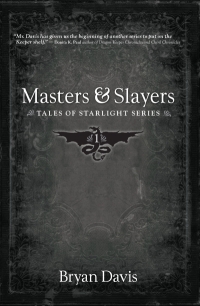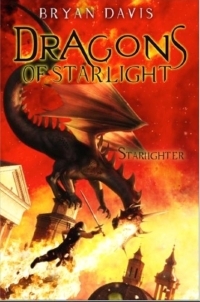Bryan Davis is the bestselling author of over fifteen novels. He has been writing for over six years. He is the author of the
Dragons in Our Midst series, the
Oracles of Fire series, and the
Echoes from the Edge series. He is currently writing two series that are related to each other. One an adult series the other a young adult series titled
Dragons of Starlight and
Tales of Starlight.
I'm happy to welcome Mr. Davis to The Narrowing Road to answer some questions on his writing life.
Seth-Masters and Slayers is the first part in an adult companion series for Dragons of Starlight. Tell us a little about that. What makes it a more adult suitable book than some of your other books?
Bryan Davis-Although Masters & Slayers is designed for adults, it can be read by teenagers, especially those who have enjoyed Starlighter, the first book in the Dragons of Starlight series. The adult designation is due to the fact that the story follows the adventures of adult characters instead of teenagers.
The good-versus-evil violence in this book is similar to that of the young adult series, except for a few more graphic events, such as the fiery execution of a boy and the severing of a murder victim’s fingers. There are no sexual scenes, but the breeding of humans by order of the slave-master dragons is mentioned. This practice takes place “off-screen” and is not described, though one character explains his dilemma when faced with an order to participate. There is no profanity or sexually provocative language.
Seth-What was (or is) your favorite book or series to write?
Bryan Davis-I have a hard time answering “favorite” questions, because sometimes my favorites change, especially when I get emails from readers who have been strongly impacted by a particular book. At that moment, the book the reader mentions can quickly rise in my favorites list. Because my favorites are influenced by reader feedback, the three books that often rise to the top are Circles of Seven, Eye of the Oracle, and The Bones of Makaidos. I get more emails about their impact that about the other books, though I have heard from readers about impact from all of my books.
Seth-What would you say has been the most important event in your career as a writer?
Bryan Davis-Probably meeting Dan Penwell at the Florida Christian Writers Conference in 2003. He was the acquisitions editor for AMG Publishers. He took a liking to my work and decided to take a chance on an unproven author. I am deeply indebted to him, and I honor him highly. He passed away earlier this year, and I am grateful that I had the opportunity to let him know how much he meant to me.
Seth-Before you started writing Raising Dragons were you a big reader of the fantasy genre?
Bryan Davis-I probably wouldn’t be considered a “big” reader of fantasy. Of course I read the standards, like The Chronicles of Narnia and Lord of the Rings, but I my range of reading beyond these wasn’t broad. I tried many novels, such as Eragon, but most didn’t interest me. I found many of them to be lacking depth and purpose.
Seth-People have said that you can learn from teaching. Do you find that you learn while teaching at conferences or other events where you teach writing?
Bryan Davis-I do learn when I teach. Teaching brings to mind persistent reminders of what I need to remember so that I don’t become lax and assume that my writing will be fine without the usual rigor I apply. Remember “show, don’t tell.” Don’t forget to foreshadow. Keep in mind the magic of vivid scenery. Don’t force dialogue. Every time I speak such words, they reinforce these principles in my mind. That’s definitely helpful.
Seth-Being a full time author, how often do you actually get the chance to sit down and read for your enjoyment?
Bryan Davis-Very rarely. Many people send me manuscripts to read, hoping to get endorsements or helpful pointers. It’s a blessing to know that people value my opinion, and I want to help as much as I can, but the pile of requests pretty much eliminates any time I have to read for enjoyment. And since most of these requests come from inexperienced writers, the manuscripts are usually poor, so the reading isn’t enjoyable. I’m afraid that’s just the nature of my occupation, and I am willing to live with it.
Seth-Where does the inspiration for your stories come from?
Bryan Davis-I get most of my basic story ideas either from my children or from dreams. Raising Dragons came from a dream about a boy who could breathe fire, and Starlighter came from an idea my daughter Amanda gave me. My gift is to be able to enhance and grow these seeds, but most of the seeds are provided by others.
Seth-You run a very active forum, correct? Does this forum have any effect on your writing?
Bryan Davis-My message forum is quite active. I sometimes ask the members for ideas, and I get great feedback. Their opinions have influenced my stories, so I am grateful for their participation. It’s really fun interacting with them.
Seth- How does an author who has as many books as yourself go about looking to publish their next book? Do publishers at that point come to you?
Bryan Davis-Publishers have sought me out but not often. Since God has granted success, I am able to submit a simple idea without much development, and since I have proven my ability to complete well-crafted stories in a timely fashion, publishers trust that I can deliver. I don’t have to finish a novel before they are willing to contract the work. They don’t even require a full proposal. That’s very helpful.
Seth-You are a Seat-of-the-pants writer if I’m not mistaken. Have you ever been or thought about being an outliner? Why is it that you prefer being a Seat-of-the-pants writer?
Bryan Davis-I have always been a seat-of-the-pants writer, because I enjoy going on an adventure with my characters. Every day I look forward to sitting down and finding out what will happen next. An open-ended story feels more realistic and allows for unexpected twists. If I am surprised by an event, then surely my readers will also be surprised. Of course, I sometimes have to go back and set up the surprises with appropriate foreshadowing, but it is still an organic way to write. The story feels alive.
I have thought about outlining a story, but those thoughts are always negative. I can’t imagine why I would do that. It would be wasted effort, because I know the story would change as I write it.
Seth-If you could go back and change any of your books, whether it was the plot or whatever it may be, would you do it?
Bryan Davis- It’s possible. I hope that my writing is improving, so it’s likely that I could improve my older books if I were to go back and polish them. Yet, I know that I did the best that I could at the time, so I would rather focus my time and efforts on new books. Still, if a reason cropped up that made sense for me to rework an older book, I could be persuaded to do so.
Seth- How does your faith in the Lord affect your writing?
Bryan Davis-My faith is central to my writing. What I believe infuses every story with sacrifice, courage, heroism, and life-giving hope. I don’t always intentionally plan spiritual themes in my stores, but because of my Christian worldview, they appear naturally. It’s the way I think.
Seth-In your experience, what has been the hardest part about writing Christian Fantasy?
Bryan Davis-The hardest part is likely the struggle to get Christians to understand the value of fantasy and that it is one of the most effective ways to communicate truth. Some Christians dismiss fantasy without understanding what it’s all about. Others even demonize it, some because of ignorance and some because of intentional folly.
Seth- Every author has a unique story that brings them to publication. How was it that you came to be a published writer?
Bryan Davis-Since these books are faith-based, the mainstream publishers didn’t show any interest. I often heard, “Too spiritual” or “Too Christian.” The Christian publishers at that time weren’t producing fantasy at all, and certainly not a series about dragons. I couldn’t find a significant Christian fantasy series for young people that had been published in the last thirty years. It didn’t matter that the Chronicles of Narnia had been one of the greatest sellers in history. In fact, when I mentioned that to one editor, hoping the Narnia success would open a door, he said, “You’re not C. S. Lewis.”
Between agents and publishers I collected about two hundred rejection notices, which I might use to wallpaper my office someday. I rewrote Raising Dragons about twenty-four times, changing it drastically in some of the rewrites. I think I made it even more radical as time went on, perhaps thinking that it might just end up as a story for myself and my family.
As I mentioned above, I finally met Dan Penwell of AMG Publishers. He had already contracted with me for a non-fiction book called The Image of a Father, and although AMG had never produced fiction, he took interest in my weird dragons story. AMG liked it so much, they started a fiction line with the series, and it has become their best selling line of books.
Seth-How, if at all, does being a homeschool dad affect your writing? (I myself being homeschooled)
Bryan Davis-It is because of homeschooling that I became a writer. Hoping to get my children excited about writing, I began writing a story for them, and I asked them to contribute. During the process, I developed a passion for writing that hasn’t faded. My kids continue to provide me with ideas and input, so homeschooling has definitely been an important contribution.
Seth-You started writing Christian Fantasy during somewhat of a revival period for the genre. Why do you think it is that there are so few Christian Fantasy books on the market?
Bryan Davis-Actually, I started writing Christian fantasy when the genre didn’t exist in the Christian publishing industry. When Raising Dragons came out, it was among the first produced in traditional Christian publishing in decades. The same month, Dragonspell (Donita K. Paul) and Beyond the Summerland (L. B. Graham) also came out, so, if my research is correct, these three books opened the gates for the Christian fantasy market.
Seth-Going on the previous question, what advice would you give to an author trying to get published in this very difficult field of writing (Christian Fantasy)?
Bryan Davis-I know many aspiring fantasy novelists. It seems that’s what half the authors I know want to write, but the Christian publishing world hasn’t caught up yet with the demand, which isn’t completely they’re fault, but that’s another topic. I would tell those authors to break free from the Tolkien and Lewis mold. Don’t try to create another Middle-earth with elves and orcs. Don’t send kids to a new world through a wardrobe-like portal where a new kind of Christ-figure dwells. Make faith a real component that fits naturally with characters of real faith.
I’d like to see another contemporary/fantasy blend like mine. I think young people of today relate to a world they recognize, and they enjoy seeing weird happenings within it. Still, there are many ways to explore new other-world fantasy ideas as well. Think out-of-the-box and write your passions. Don’t chase after what the market appears to want.
Seth-Is there anything else you would like to add?
Bryan Davis-Aspiring writers, I commend you for wanting to communicate your ideas and passions. That motivation will carry you far. You will hit roadblocks, and the temptation to become discouraged might be overwhelming. Don’t give up. If God has put within you the passion to write, then you can’t give up. Continue learning the craft. Get better and better all the time. Don’t lose sight of the message that God has given you to convey. If God has really called you to pursue this dream, then you have no choice but to continue.
I want to think Mr. Davis again for sharing some very helpful thoughts on writing, fantasy, and the Christian faith. You can get in contact with him or check out some of his books on his
website.








